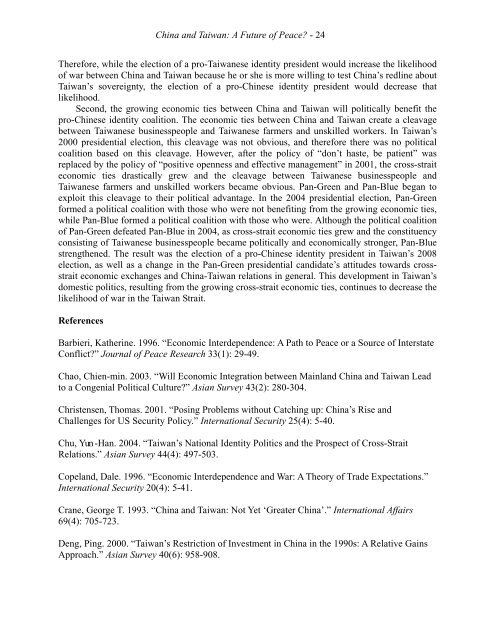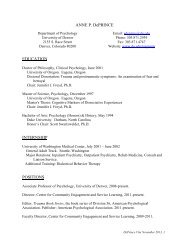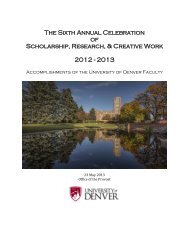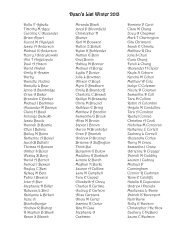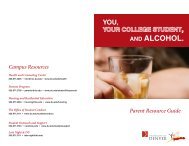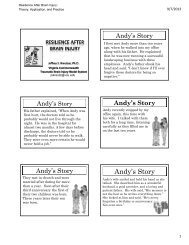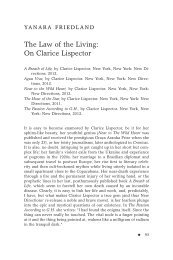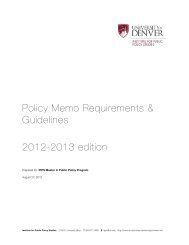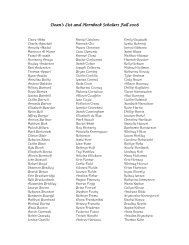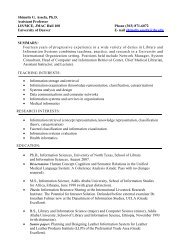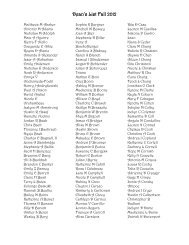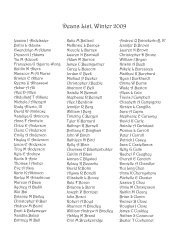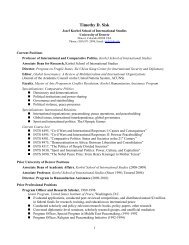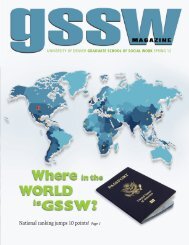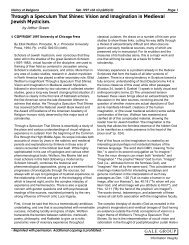Chien-Kai Chen, “China and Taiwan: A Future of Peace? A Study of ...
Chien-Kai Chen, “China and Taiwan: A Future of Peace? A Study of ...
Chien-Kai Chen, “China and Taiwan: A Future of Peace? A Study of ...
Create successful ePaper yourself
Turn your PDF publications into a flip-book with our unique Google optimized e-Paper software.
China <strong>and</strong> <strong>Taiwan</strong>: A <strong>Future</strong> <strong>of</strong> <strong>Peace</strong>? - 24<br />
Therefore, while the election <strong>of</strong> a pro-<strong>Taiwan</strong>ese identity president would increase the likelihood<br />
<strong>of</strong> war between China <strong>and</strong> <strong>Taiwan</strong> because he or she is more willing to test China’s redline about<br />
<strong>Taiwan</strong>’s sovereignty, the election <strong>of</strong> a pro-Chinese identity president would decrease that<br />
likelihood.<br />
Second, the growing economic ties between China <strong>and</strong> <strong>Taiwan</strong> will politically benefit the<br />
pro-Chinese identity coalition. The economic ties between China <strong>and</strong> <strong>Taiwan</strong> create a cleavage<br />
between <strong>Taiwan</strong>ese businesspeople <strong>and</strong> <strong>Taiwan</strong>ese farmers <strong>and</strong> unskilled workers. In <strong>Taiwan</strong>’s<br />
2000 presidential election, this cleavage was not obvious, <strong>and</strong> therefore there was no political<br />
coalition based on this cleavage. However, after the policy <strong>of</strong> “don’t haste, be patient” was<br />
replaced by the policy <strong>of</strong> “positive openness <strong>and</strong> effective management” in 2001, the cross-strait<br />
economic ties drastically grew <strong>and</strong> the cleavage between <strong>Taiwan</strong>ese businesspeople <strong>and</strong><br />
<strong>Taiwan</strong>ese farmers <strong>and</strong> unskilled workers became obvious. Pan-Green <strong>and</strong> Pan-Blue began to<br />
exploit this cleavage to their political advantage. In the 2004 presidential election, Pan-Green<br />
formed a political coalition with those who were not benefiting from the growing economic ties,<br />
while Pan-Blue formed a political coalition with those who were. Although the political coalition<br />
<strong>of</strong> Pan-Green defeated Pan-Blue in 2004, as cross-strait economic ties grew <strong>and</strong> the constituency<br />
consisting <strong>of</strong> <strong>Taiwan</strong>ese businesspeople became politically <strong>and</strong> economically stronger, Pan-Blue<br />
strengthened. The result was the election <strong>of</strong> a pro-Chinese identity president in <strong>Taiwan</strong>’s 2008<br />
election, as well as a change in the Pan-Green presidential c<strong>and</strong>idate’s attitudes towards crossstrait<br />
economic exchanges <strong>and</strong> China-<strong>Taiwan</strong> relations in general. This development in <strong>Taiwan</strong>’s<br />
domestic politics, resulting from the growing cross-strait economic ties, continues to decrease the<br />
likelihood <strong>of</strong> war in the <strong>Taiwan</strong> Strait.<br />
References<br />
Barbieri, Katherine. 1996. “Economic Interdependence: A Path to <strong>Peace</strong> or a Source <strong>of</strong> Interstate<br />
Conflict?” Journal <strong>of</strong> <strong>Peace</strong> Research 33(1): 29-49.<br />
Chao, <strong>Chien</strong>-min. 2003. “Will Economic Integration between Mainl<strong>and</strong> China <strong>and</strong> <strong>Taiwan</strong> Lead<br />
to a Congenial Political Culture?” Asian Survey 43(2): 280-304.<br />
Christensen, Thomas. 2001. “Posing Problems without Catching up: China’s Rise <strong>and</strong><br />
Challenges for US Security Policy.” International Security 25(4): 5-40.<br />
Chu, Yun -Han. 2004. “<strong>Taiwan</strong>’s National Identity Politics <strong>and</strong> the Prospect <strong>of</strong> Cross-Strait<br />
Relations.” Asian Survey 44(4): 497-503.<br />
Copel<strong>and</strong>, Dale. 1996. “Economic Interdependence <strong>and</strong> War: A Theory <strong>of</strong> Trade Expectations.”<br />
International Security 20(4): 5-41.<br />
Crane, George T. 1993. <strong>“China</strong> <strong>and</strong> <strong>Taiwan</strong>: Not Yet ‘Greater China’.” International Affairs<br />
69(4): 705-723.<br />
Deng, Ping. 2000. “<strong>Taiwan</strong>’s Restriction <strong>of</strong> Investment in China in the 1990s: A Relative Gains<br />
Approach.” Asian Survey 40(6): 958-908.


